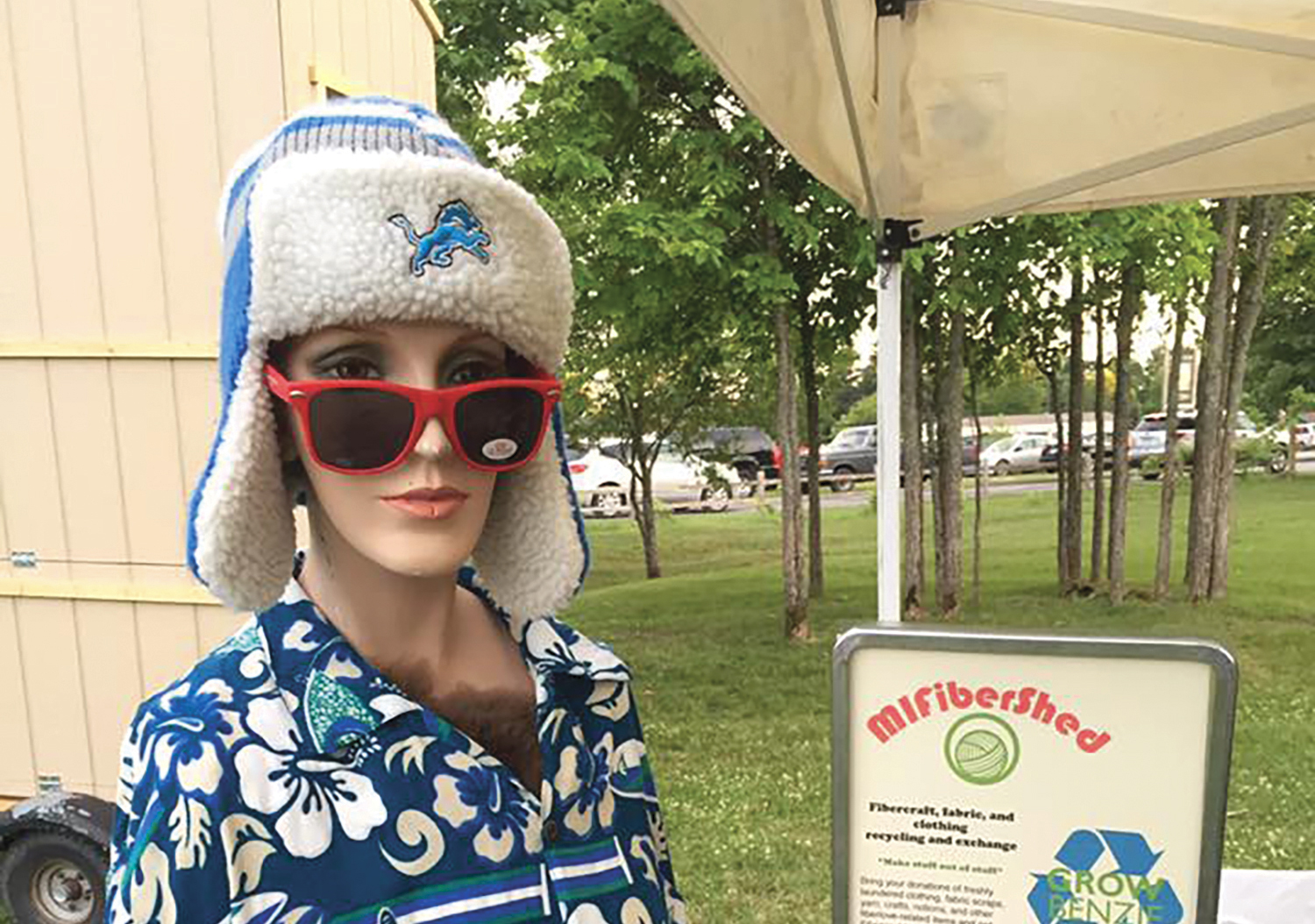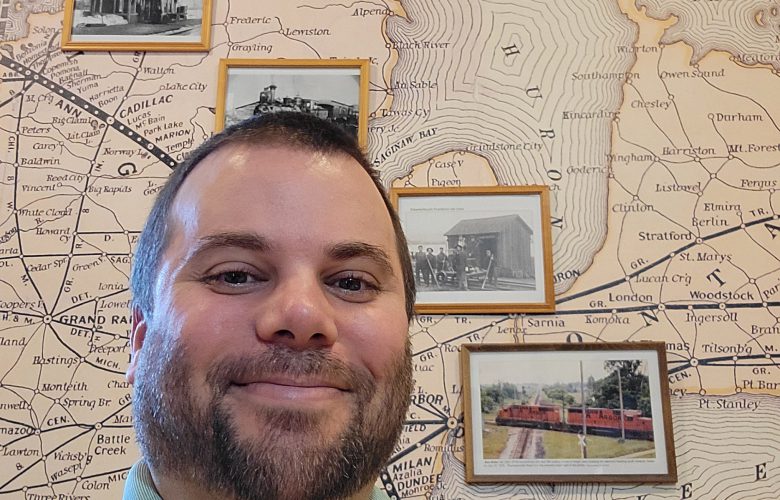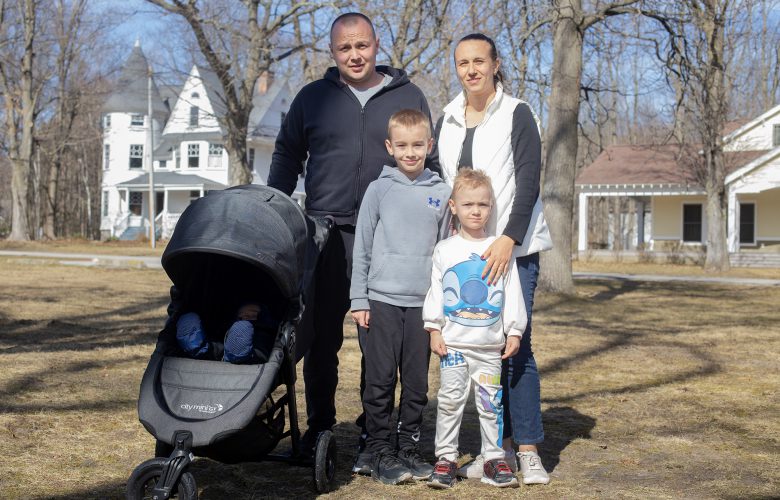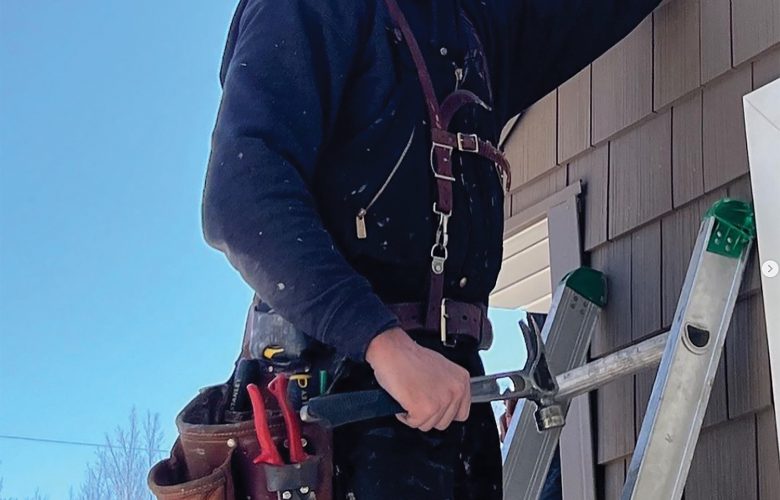Grow Benzie’s MIFiberShed
By Nicole L. Bates
Current Contributor
Have you ever thought about where your clothing comes from? Really thought about it? “Made in China.” Made in the Philippines.” “Made in Mexico.”
Or thought about where your clothes go when you are finished with them—you gain weight, you lose weight, your teenage son grows six inches in a year, or you just can no longer rock that neon pink leotard that got you so many compliments in the ’80s.
Sure, some of these items can be donated to Benzie Area Christian Neighbors (BACN), Love Inc., or Goodwill. But what about those items that simply cannot be donated—the severely out of style, the ones that have holes or are stained—where do those items go? If you are like most Americans, they probably end up in a landfill.
Now there is another option in Benzie County, however, and it has many crafters, fiber artists, and thrifty used-clothing connoisseurs quite excited.
The Grow Benzie MIFiberShed, located in the blue pole barn building behind Grow Benzie, celebrated its grand opening last month. Visitors can buy new-to-them used garments, as well as donate their old garments.
“Our goal is to eliminate fiber waste, in all its forms, through redistribution and recycling,” says Emily Votruba, founder and visionary behind MIFiberShed.
The Fibershed Concept
A lot of time and energy, not to mention documentary filmmaking, has gone into the “local” idea when it comes to our food-production cycle—there is increasing awareness that food is fresher, tastes better, and has a lower carbon footprint when it comes from nearby.
Over the past few years, though, there has been added interest in creating local economies around clothing, garments, and textiles, as well.
The invisible circle that we can draw around where our garments come from has been coined the “fibershed” concept. Similar to the concept of a “watershed,” a fibershed is a geographical destination. At the center of this land-based idea is the core belief that keeping things as local as possible—from growth, to production, to distribution of fiber goods—is key to creating sustainable communities.
The idea of a sustainable clothing cycle is a bit different than a sustainable food cycle, however. With food, the entire process can begin and end in the same area, without any outside influence. In the fiber cycle, much of the material will enter the area from outside sources, but the hope is that those materials will be reused in the local area, rather than be thrown away.
In September 2014, Votruba participated in the inaugeral Fiber Arts Weekend, with a panel discussion at Interlochen Center for the Arts that focused on the impact of fiber production and the birth-to-death cycle of fiber products. There have been three Fiber Weekends thus far, and last year, the documentary film The True Cost was shown. The film asks what is the price—ecologically, socially, holistically—for our disposable clothing culture? For instance, almost 80 billion pieces of new clothing are purchased each year around the globe, and about 82 pounds per person ends up in the landfill. (For more, see a previous article from The Betsie Current last fall on this topic.)
Influenced by Carol Laughing Waters—a handweaver, natural-plants dyer, and founder of the Leelanau FiberShed Guild—as well as the folks behind Crosshatch Fiber Guild West Bay, the Grow Benzie MIFiberShed, and the MIFiber Guild hope to keep the entire process local, fair trade, and environmentally responsible in the Benzie County area.
The founders of the MIFiberShed project also hope for this location to be a place where crafters and fiber artists can find low-cost materials to experiment with, as well as like-minded people with whom they can trade ideas.
“We’d like to become a resource, a low-stakes way for people to experiment with fiber and craft projects,” Votruba says.
How Does It Work?
MIFiberShed accepts donations of fiber scraps, clothing, thread, yarn, lace, and fibercraft tools. For every pound of items donated, you will receive one fibercredit. These fibercredits can then be used to purchase items at the MIFiberShed at a rate of one fibercredit per pound of material. In other words, one pound in equals one pound out.
Shoppers are welcome, with or without donations or credits. One pound of material can be purchased for five dollars, cash or check, and that money will count as a donation toward Grow Benzie.
If you have donations, or wish to exchange used material for new-to-you material, the MIFiberShed requests that you bring freshly laundered items during business hours; there is not currently a drop site for items to be left outside of business hours.
MIFiberShed is unique in that they accept, even welcome, broken, torn, and permanently stained items—as long as they are washed prior to donating—that other resale centers turn away. Additionally, they will accept unprocessed wool, alpaca, and scrap angora, as long as it is washed. MIFiberShed also welcomes non-fiber items that would be useful for running the shop itself, such as clothespins and plastic storage tubs with lids.
How Can I Get Involved?
Those with an interest in fiber crafts, or a passion for small business incubation, can support this project in a variety of ways—volunteer time as a worker during business hours; become a craft project leader; bring donations and leave with new-to-you clothing or material for art projects; join the Facebook group, and spread the word!
The Grow Benzie MIFiber Guild is also looking for volunteers, crafters, and local fiber producers to form a community of individuals to collaborate and make this local fiber cycle project beneficial to all involved.
During winter hours, MIFiberShed plans to collaborate with other area fiber guilds and donate or exchange materials needed for local crafters and to run the Days For Girls project, also located at Grow Benzie, in the basement sewing studio. (See a previous article about Days For Girls from Volume V Issue 12 of The Betsie Current here: bit.ly/2tFQIPH)
Good News for Crafters
Do you have a great project idea, but do not have the money to start up your own business? MIFiberShed can help!
With an emphasis on crafting, fiber art, and small-business start-up, another goal of MIFiberShed is to provide a neutral space where individuals can “test the market” on a product or idea, without the prohibitive start-up costs.
“We’re literally giving material away and hoping that someone will do something with it,” Votruba says. “I would like to see small businesses emerge that have been inspired by materials that they find here.”
So far this summer, a few crafters have used the MIFiberShed space to work on projects using recycled fabrics and local fiber. For instance, Votruba is experimenting with carded milkweed fluff to use as a buoyant stuffing for floating beach items, such as toys. Votruba’s mother, Mary Link, has been working with donated T-shirts, converted to “yarn,” to make durable rugs with the basic knitting stitch. Michael Shaw has been working on his beautiful hooked rag rugs using strips of fabric.
One project that MIFiberShed would like to spearhead, in collaboration with Grow Benzie, is the production of beeswax-coated food wrap, using donated cotton fabric. The beeswax would come from Grow Benzie’s hives. The product could be made on-site and then sold at Grow Benzie’s Farmers’ Market or at MIFiberShed. This would be a perfect example of the full-circle theme that is being emphasized by the Guild and its members.
Grow Benzie is located at 5885 Frankfort Highway/M-115, just outside of Benzonia. The Grow Benzie MIFiberShed is open Mondays from 12-7 p.m and Saturdays from 9 a.m. to 4 p.m. They would love to expand their hours and are actively seeking volunteers to help during additional days and times. Throughout the summer, and given enough project leaders, workshops will be held at MIFiberShed during Grow Benzie’s Farmers’ Market hours, on Mondays from 3-7p.m. Stop by or call 231-399-0098 to see what else you can do to help.




